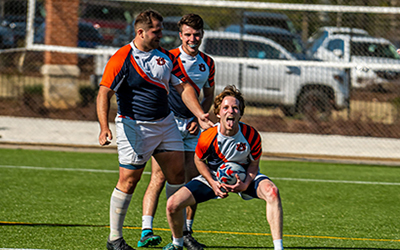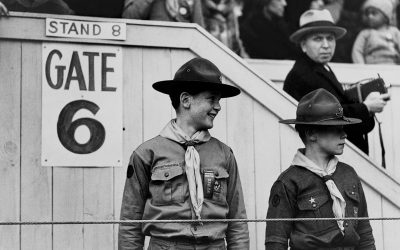From the Sphinx to space, flappers to french fries, Auburn’s history is filled with stories that are too good to be true. Except they are.
By Jeremy Henderson ’04
You know a lot of things. You’ve heard a lot of names. George Petrie. Octavia Spencer. Punt, Bama, Punt. Tim Cook. The Creed. Toomer’s Lemonade. Bo Knows.
But Auburn history is richer—and way wackier—than you might think, and the impact Auburn graduates have had on the nation and the world (and even the universe) is deeper than you might guess.
I’ll see your Ken Mattingly and raise you a Ham the Astrochimp.
I’ll see your “War Eagle Fight Song” and raise you a “More Precious Than Silver,” far and away the most popular tune to ever come out of Auburn—the McDonald’s on Magnolia Ave. to be exact.
From pranks to praise songs, from flappers to the final frontier, here’s a handful of Who-Knew? happenings and unheralded handiwork—and hats—from once upon the Plains and around the globe.
I believe in the primate touch
It wasn’t just Auburn engineers and physicists. Turns out, even Auburn-trained veterinarians had a hand in the earliest days of America’s space program.
Yep, Dr. Richard Benson, class of ’49, was the primary physician (and even, briefly, roommate) for the immortal “Ham the Astrochimp,” the first American in space.
Ham was the man, as it were. He blasted into the final frontier on Jan. 31, 1961, aboard a Huntsville-built Mercury Redstone rocket in order to put astronaut Alan Shepard’s mind at ease. Thanks to Ham, NASA knew its first astronaut wouldn’t die up there and that, if he wanted, he’d be able to pull levers for banana pellets with immunity.
And the first Earthling Ham encountered after his plexiglass-covered capsule was extracted from the ocean was a stethoscope-brandishing Benson, who greeted the chimp with what the Auburn Alumnews called “an Auburn handshake.”
Benson got down to business, checking Ham’s vital signs—and, eventually, his diapers.
“They’re damp,” Benson announced.
Who can blame him?
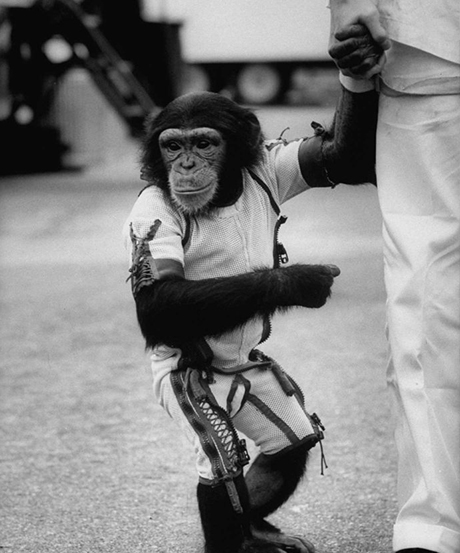
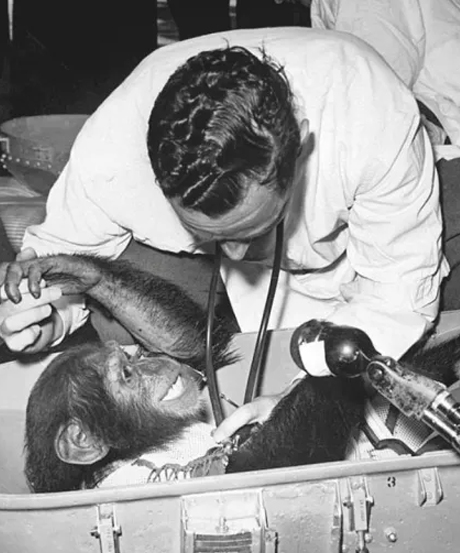
Dr. Richard Benson with HAM the astrochimp
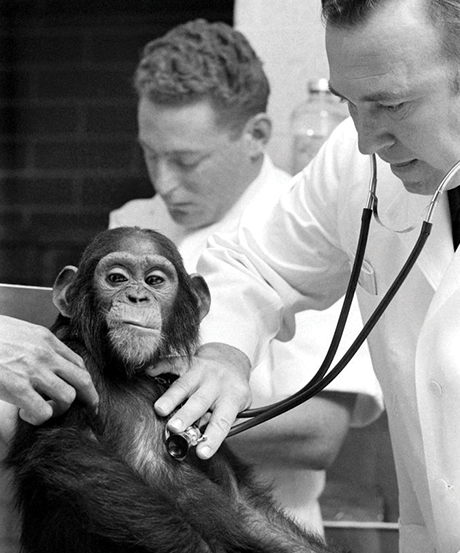
Bodda-Giza Bah
That November, Capt. Earle R. Smith, an Auburn native, 1930 Auburn grad and former football team manager serving as a special service officer with the 90th Reconnaissance Wing, wrote a letter to his father Emmett P. Smith. He claimed to have done something, well, monumental.
He’d been feeling anxious, he told his dad. But that had less to do with the impending Saharan conflicts with Rommel’s dreaded Afrika Korps, and more to do with the upcoming Auburn-Georgia game. Smith was about to miss the renewal of the South’s oldest rivalry for the first time in two decades. And he wasn’t happy about it. He still wanted to do something to support his school. And he picked one hell of a way to do it.
He bribed his Egyptian guide to bring him a hammer, a chisel and a ladder and to look the other way while he chiseled “War Eagle, give ’em hell Auburn” on the face of the Great Sphinx of Giza.
Smith’s father forwarded the letter to the Montgomery Advertiser. The Advertiser turned it into a story. True or not—and Smith swore that Auburn folks who happened to make it over to the Giza Plateau could check it out for themselves—the story went viral, at least regionally, and periodically returned to the headlines on slow news days over the next decade.
Here’s the Plainsman’s writing about it two years later, in the summer of ’44, when Smith returned to campus to offer a first-hand account.
“Gazing upon the huge, inscrutable countenance, the captain, always a loyal Auburn man, decided that [the Sphinx] had been silent long enough and that henceforward it should proclaim, or at least exhibit, to the whole world a symbol of that dauntless ‘Spirit’ which has made the college of the Plains famous throughout the world of sports…
After a laborious assent, the Auburn grad went at his job, chiseling away under the relentless desert sun. He cut ‘War Eagle’ in bold letters across one cheek. His reward would come when Auburn men of the future, looking on that inscription, would thrill with pride.”
It came sooner than that: Auburn wound up upsetting the No. 1-ranked, Rose Bowl-bound Bulldogs, 27-13.
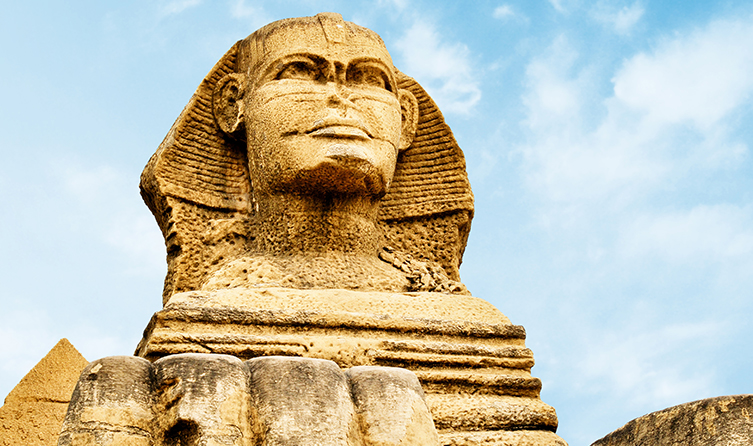
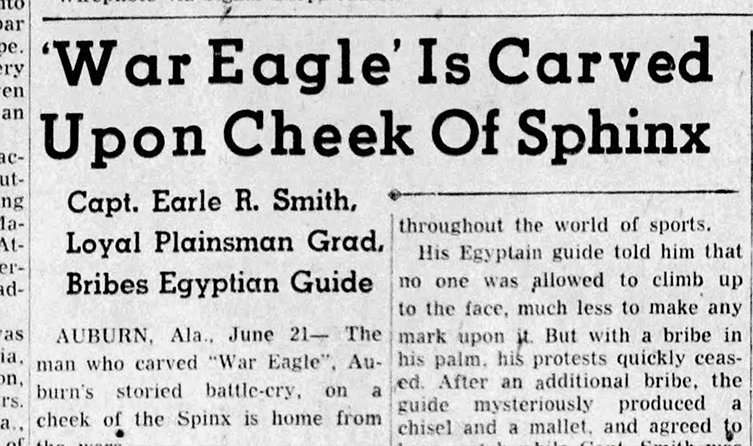
The Legend of Zelda
In 1919, five members of the Auburn Football team, eventual Southern Intercollegiate Athletic Association champions, formed a not-so-secret society. It was a facetious fraternity of sorts called Zeta Sigma. Initiation requirements? Just one. Get to Montgomery and score a date with Zelda. That Zelda: Zelda Sayre, socialite extraordinaire, flapper archetype and future bride of author F. Scott Fitzgerald.
Zelda was the youngest daughter of a prominent Montgomery judge and, by most accounts, an absolute hell raiser. Sneaking out at night. Sneaking out by day. Short skirts. Flesh-colored swimsuits. Popping corks. Breaking hearts.
Sure, the “Zelda Show” occasionally traveled to Tuscaloosa, to Marion or to other college towns. But as for campus cavorting, Auburn seems to have practically been home base. It was closer, of course. And her older brother Anthony was briefly a student. Oh, and, according to local legend, she found the Sigma Alpha Epsilon lily pond perfect for skinny dipping.
Among the devotees of Zeta Sigma? Star Auburn halfback Francis Stubbs, whose class photo Zelda kept in her scrapbook (partly to make F. Scott jealous). In fact, so constant was Stubbs’ companionship during Zelda’s Village visits, her future husband actually had to mail some of his promises of fame and fortune to Stubbs’ care to make sure she received them.
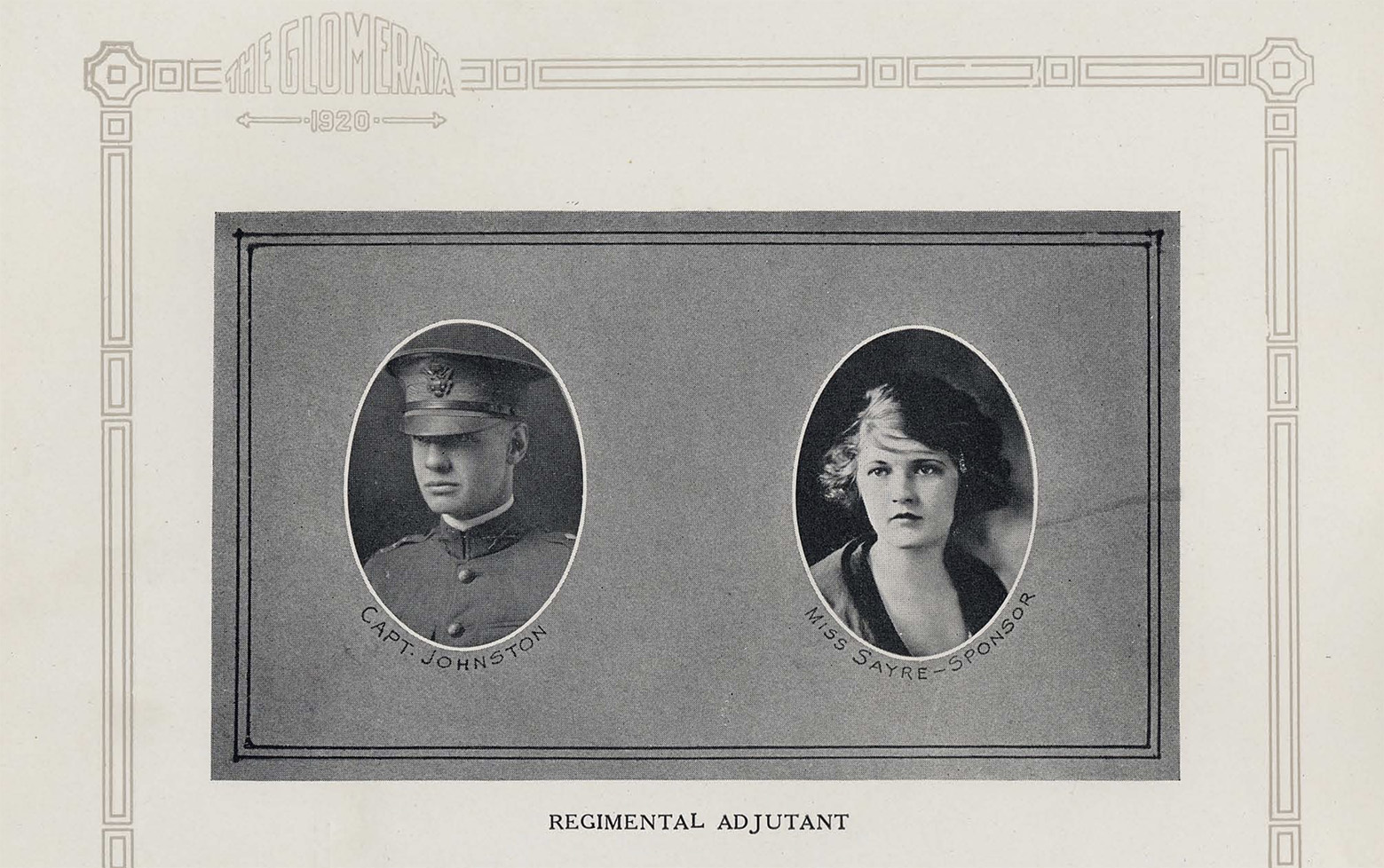
But F. Scott apparently wasn’t Stubbs’ only rival for the libertine legend’s affection. According to letters published in “Dear Scott, Dearest Zelda,” his roommate (who had a life-size photo of her printed up for their room) apparently thought he was going to marry her right up until she and Fitzgerald tied the knot.
She’d also apparently bewitched the entire ROTC.
In 1920, she was the sponsor for the A.P.I. Regimental Adjutant Cadet Corps—nearly every organization back then had a fetching female sponsor—and her photo is prominently included in the Glomerata. In the same letter to Scott thanking him for the engagement ring, she mentions that 60 Auburn cadets—or “loves” as she referred to them—had recently visited her in Montgomery.
She also served as sponsor for a few football games, including the Georgia game and the big Thanksgiving showdown against Georgia Tech in Atlanta. And she made sure Fitzgerald knew about it.
“Nov. 1—Columbus—sponsor Auburn-Ga. game THANKSGIVING—Atlanta ditto AUBURN-TECH…It’s awfully hard to do everything by a foot-ball schedule, but I’ve been making a frantic effort at it for the last month. Between the games and my piano-lessons I’ll probably be a mere shadow of the girl I once was by the time you come.”
But Zelda—or Zelder, as she was affectionately known on the Plains—wasn’t just a sponsor or decoration. She was a real-life Auburn rooter. Sure, her interest may have had something to do with her many athlete suitors. Still, when she spoke of Auburn’s team, it wasn’t “they”—it was “we.”
Case in point: The telegram she sent Auburn’s All-Southern superstar Pete Bonner (“Care Auburn football team”) at the Piedmont Hotel in Atlanta after Mike Donahue and Auburn downed John Heisman’s famed Georgia Tech Golden Tornadoes 14-7 to claim the 1919 conference championship.
“Shooting a seven, aren’t we awfully proud of the boys, give them my love—knew we could.”
More Precious Than French Fries
In fall 1978 new Auburn graduate and former Auburn volleyballer Lynn DeShazo was on Magnolia Ave. trying to walk humbly with her God. And failing miserably. At least, that’s what it felt like the afternoon she wrote one of the most popular praise and worship songs of the past half century.
She’d taken a job at McDonald’s to buy herself time to figure out how she and her recreation administration degree—or maybe she and her guitar—might now best serve the Lord in the real world. And when it came to discerning His will, the folks with the new, dynamic campus ministry Lynn had joined, Maranatha House, headquartered in the old Chi Phi house a block away from the golden arches, had two recommendations.
The praying part? That was easy. That came naturally. The fasting did not.
Had she just been working the register that afternoon, maybe things would have been different. Maybe she would have made it the whole day. But she wasn’t. She was on fry duty—for hours. Abstaining from regular old food is one thing. Abstaining from McDonald’s french fries is something else entirely.
“They’re the best things on the planet,” DeShazo says. “They’re delicious.”
Too delicious. She caved. She broke. She looked to her left, looked to her right, then swiped two or three of the sin sticks from the tray, savoring (and regretting) every bite.
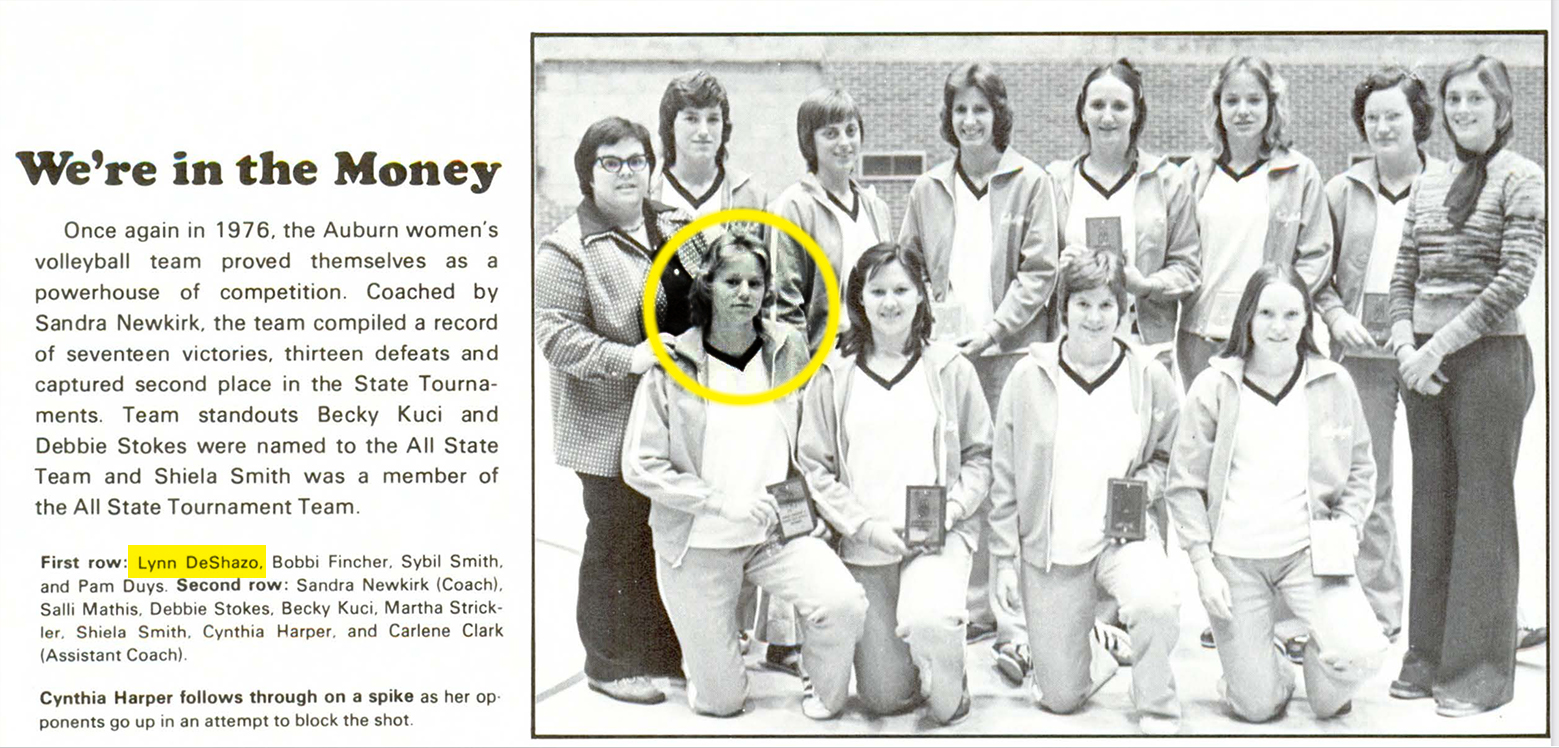
“Immediately, this kind of cloud of condemnation came over me, like, ‘you’re the worst Christian on the planet.’ Those are the kinds of things we tell ourselves when we’re vulnerable as young believers,” Deshazo says. “So, at the end of my shift, I went home to clean up for a prayer gathering and spent some time getting my heart right. I sat down with my Bible and my guitar and spent some time worshiping the Lord. And it was just a spontaneous expression of worship.”
“It” was “More Precious Than Silver,” a simple one-verse song with a Proverbs-inspired chorus that has echoed over Christendom for more than 40 years.
Lord, you are more precious than silver. Lord, you are more costly than gold. Lord, you are more beautiful than diamonds. And nothing I desire compares with you.
The song slowly spread, mostly through word of mouth, DeShazo granting permission to enchanted music ministers without a second thought. One “sure, go ahead” was for an album released by Texas-based Bible college Christ For The Nations.
Next thing she knows, she’s getting letters from folks across the country and the globe requesting her blessing to record it, sing it and share it with the world.
DeShazo has written plenty of other popular songs. But none as popular as “More Precious Than Silver.” It’s in hymnals. And Lord knows how many “various artist” compilations. The ’90s saw a couple of techno versions and a ska-punk version. “That one,” DeShazo said, “is just ridiculous.”
More recently, recordings posted this year to YouTube by praise and worship purveyors Bethel Music, including one by powerhouse songstress Steffany Gretzinger are already totaling nearly a million views. Gretzinger’s alone is sitting at more than a million streams in two years on Spotify.
All thanks to a few french fries at the Auburn McDonald’s.
Salt of the earth, indeed.
How Auburn’s Modern Art Collection Helped Found A Museum
A Georgia O’Keeffe for 50 bucks? The unbelievable saga of how Auburn purchased 36 controversial masterpieces and opened a world-class art museum for the 21st century.
Auburn Rugby Club’s Rise to Greatness
For decades, Auburn’s Rugby Club fought for relevance as much as victory. Then they were national champions.
Operation Usher
In days of old, Boy Scouts ushering fans to their seats were a common sight at Auburn football games. What happened?

